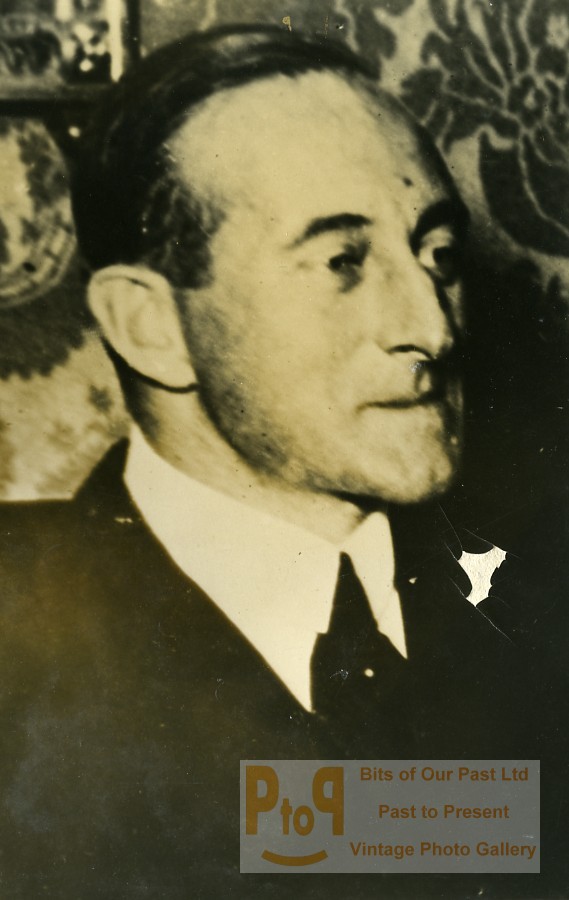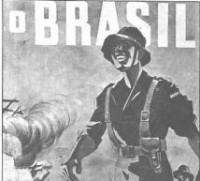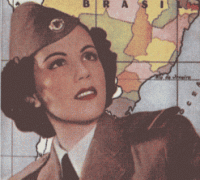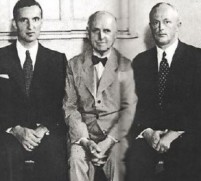BRAZIL. THE HARD ROAD TO WAR * - THE HARD ROAD TO WAR
18)GERMAN AMB KARL RITTER

RITTER, KARL
* German Ambassador in Brazil 1937-1938.
Karl Ritter was born in the German city of Dörflas on June 5, 1883.
After graduating from law school in October 1905, he worked in Berlin as an intern at the Cologne Journal, joining in November 1907 the civil service of the state of Bavaria. In December 1910, he qualified to take the second legal exam, being able to start his professional activities as a lawyer.
In 1919, he was admitted to the State Economic Institute and, in the following year, he became an adviser to the Ministry of Finance of his country. In February 1922, he joined the ranks of the Ministry of Foreign Affairs, being seconded to the special section of economy as a second-class minister. Promoted to first-class minister in 1924, he took over as head of the economic policy department of the ministry, becoming one of the main organizers of the commercial offensive undertaken by Germany in the 1930s, already under the Nazi regime.
In 1934, he prepared for a special delegation to come to Brazil to negotiate the implementation of the clearing trade (carried out without the use of foreign exchange) and, two years later, he actively participated in the talks held in Berlin for the signature of the cleared trade adjustment between the two countries.
In June 1937, he arrived in Rio de Janeiro, then Federal District, to assume the functions of ambassador of his country, replacing Arthur Schmidt-Elskop. At the end of November, after Getúlio Vargas decreed the Estado Novo, he declared that “there were no political differences between Brazil and Germany and that I could not imagine that any would emerge in the future”. However, soon afterwards a point of friction arose between Ritter and the Vargas government over the organization of the Nazi Party in Brazil, headed by the cultural attaché of the German embassy, Hans Menning von Cossel, and especially active among the German colony based in the South from the country.
After the dissolution of all national political parties, enacted in December 1937, the government determined strict measures against the activities of Nazi-fascist agents in Brazil, which led to the arrest, in February of the following year, of Ernst Dorsch, provoking the first incident between Ritter and Itamarati. The Nazi Party's action then became increasingly offensive, accentuating the concerns of Brazilian military chiefs about internal security. On April 18, the operation of foreign political parties in the national territory was suspended, and the use of German in private schools - hitherto frequent in the South, began to suffer restrictions, as part of a nationalization campaign in education.
On May 10, 1938, Ritter gave Chancellor Osvaldo Aranha a note of protest against the decisions taken by the Brazilian government. The following morning, groups linked to the Brazilian Integralist Action (AIB), of fascist inspiration, tried to assault the Guanabara palace, Vargas' official residence, with the aim of deposing and imprisoning the head of the government. Despite precarious legalistic resistance, the attackers were contained within hours. Convinced that the uprising had the help of Nazi agents, the Brazilian authorities arrested six German citizens, including a senior official at that country's Ministry of Transport, named Koenig. Ritter reacted drastically to these facts, even requesting permission from Berlin to threaten the breakdown of diplomatic relations. The ambassador's conduct ended up making him incompatible with Osvaldo Aranha and later deserved reparations from the German Chancellor, Joachim von Ribbentrop.
In late June, another plan of integralist revolt was discovered in the south of the country, causing further worsening of relations with Germany. The following month, Ritter held a meeting in Rio de Janeiro with representatives of the German colonies based in Chile, Argentina and Uruguay to discuss the “anti-German campaign” in Latin America.
In August 1938, Karl Ritter traveled to Germany to attend the Nazi Party congress, held in Nuremberg. Osvaldo Aranha took this opportunity to request that the Brazilian ambassador in Berlin, José Joaquim Muniz de Aragão, forward to the German authorities a request for a change of his representative in Brazil.
The issue was practically resolved when Muniz de Aragão announced Ritter's return to Rio de Janeiro, for a few days, with the aim of taking Vargas's proposals for the installation of a steel plant to Vargas. Osvaldo Aranha strongly opposed this trip. In view of the impasse created, Ritter was declared persona non grata by the Brazilian government on September 21, 1938, leading Germany to adopt a similar position in relation to Muniz de Aragão. The normalization of diplomatic relations only took place in June of the following year, with the appointments of ambassadors Ciro Freitas Vale for Berlin and Kurt Prüfer for Rio de Janeiro.
The issue was practically resolved when Muniz de Aragão announced Ritter's return to Rio de Janeiro, for a few days, with the aim of taking Vargas's proposals for the installation of a steel plant to Vargas. Osvaldo Aranha strongly opposed this trip. In view of the impasse created, Ritter was declared persona non grata by the Brazilian government on September 21, 1938, leading Germany to adopt a similar position in relation to Muniz de Aragão. The normalization of diplomatic relations only took place in June of the following year, with the appointments of ambassadors Ciro Freitas Vale for Berlin and Kurt Prüfer for Rio de Janeiro.
In October 1938, Ritter was sent to Czechoslovakia, already under German occupation, as a delegate to the economic negotiations provided for in the Munich agreements, signed that same year. From May 1939, he served until the end of the Second World War as a liaison officer between the Ministry of Foreign Affairs and the staff of German forces, and in 1940 he also headed the delegation of his country that traveled to the Soviet Union to negotiate economic agreements.
After Germany's defeat in the war, Ritter responded to the Nuremberg trial and was sentenced to four years in prison.
.
He died on July 31, 1968.
Paulo Brandi
SOURCES: BANDEIRA, L. Presença; CORRESP. EMB. REP. EDF. GERMANY; HILTON, S. Brasil and the big ones; LEVINE, R. Vargas; SILVA, H. 1938; SILVA, H. 1939.



